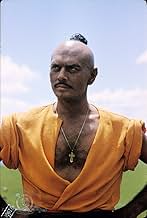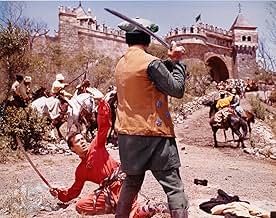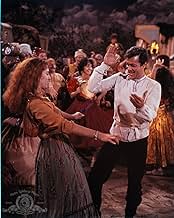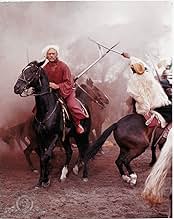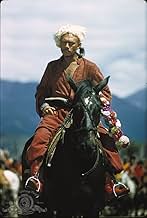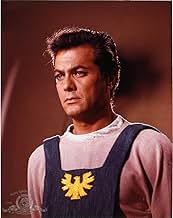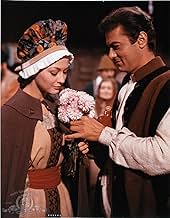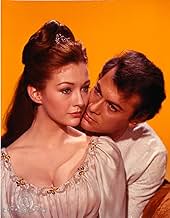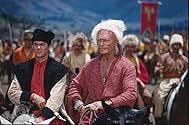Na Ucrânia do século XVI, os senhores poloneses e cossacos ucranianos lutaram pelo controle da terra, mas as frequentes invasões turcas os forçaram a se unir contra o inimigo turco em comum.Na Ucrânia do século XVI, os senhores poloneses e cossacos ucranianos lutaram pelo controle da terra, mas as frequentes invasões turcas os forçaram a se unir contra o inimigo turco em comum.Na Ucrânia do século XVI, os senhores poloneses e cossacos ucranianos lutaram pelo controle da terra, mas as frequentes invasões turcas os forçaram a se unir contra o inimigo turco em comum.
- Indicado a 1 Oscar
- 3 indicações no total
- Servant
- (não creditado)
- Direção
- Roteiristas
- Elenco e equipe completos
- Produção, bilheteria e muito mais no IMDbPro
Enredo
Você sabia?
- CuriosidadesAccording to director J. Lee Thompson, in an interview in Yul Brynner: O Homem Que Era Rei (1995), there was a misunderstanding with the hundreds of Argentine gauchos playing horsemen . They were told that horsemen who fell off their horse during an attack scene would be paid extra--but only those who were directed to do so. When the scene was shot, two-thirds of them fell off their horses and expected the extra pay. Upon being told they were not going to be paid extra, they threatened to strike. Yul Brynner then took steak dinners out to their encampment that evening and spent hours entertaining them. Impressed by this, the gauchos returned to work the next day.
- Erros de gravaçãoThe Cossack's "scalp-lock" is not on the back but the front! Only the old Cossack is the one that has it correctly.
- Citações
Taras: My son, why? Why?
Andrei Bulba: I did what I had to do.
Taras: From the day I plunged you in the river to give you life, I loved you as I loved the steppes. You were my pride! I gave you life. It is on me to take it away from you.
- Cenas durante ou pós-créditosThanks to the army of the Argentine Republic.
- ConexõesEdited into O Túnel do Tempo: Attack of the Barbarians (1967)
What's strangely muted in this version though is the religious angle. The Poles are Roman Catholic and the Ukranians are Russian Orthodox, it's a very big part of the reason for the resentments shown here yet we never see the religious beliefs portrayed for either group. Not sure why the script didn't include it.
As rulers the Poles hire out the Cossack Ukranians who in today's terminology might be considered a paramilitary outfit to fight off the Ottoman Turks and then turn on them. Yul Brynner as one of the Cossack brigade commanders lops off the right hand of Guy Rolfe, the Polish prince in retribution, but that hardly satisfies. He goes back to the steppes of the Ukraine and awaits a time for some real payback.
In the meantime he fathers two sons, Tony Curtis and Perry Lopez, who both inherit their father's geopolitical views. Brynner sends them off to school in Poland to learn all the Poles know.
While there Curtis falls in love with a Polish princess Christine Kauffman. It's the beginning of his downfall as a Cossack.
In his memoirs Tony Curtis says that Yul Brynner was a strangely aloof character with a sort of self imposed grandeur about him in his manner. But that Taras Bulba was a part he was born to play. I certainly can't visualize anyone else in the role, including Burt Lancaster who originally had the screen rights then gave them to Tony Curtis when he couldn't do the film. Of course Brynner being in the title role might have had some resentments to being second billed to Curtis, but Curtis in fact as a co-producer and he who produces decides billing.
Curtis also mentions that on the Argentine pampas location away from American laws, the long banned 'flying W' was used in the filming of the battle and charge scenes and many horses were killed. He also mentions that with production overrun costs and accountants ripping him and the film company off what started as a three million dollar film became a nine million dollar film and Taras Bulba in theatrical release barely cleared ten million.
However Tony did get a second wife out of the film. Christine Kauffman became the second Mrs. Tony Curtis after the film. Curtis says that Christine did not break him and Janet Leigh up, that things were over before he met here, still that was the common gossip back in the day.
Director J. Lee Thompson made great use of the Argentine pampas standing in for the Ukraine steppes and one does get a feel for the Cossack love of the land the freedom of the wide open spaces. Cossack stories in the Ukraine are just like our American westerns. Those people for all their faults settled and conquered much of what is now Russian Federation.
As a bonus Franz Waxman's musical score which did earn Taras Bulba it's only Academy Award nomination is really quite rousing. We get to hear Yul Brynner sing in this film which is a treat, a Cossack drinking song. And the love theme for Curtis and Kauffman, The Wishing Star, is a very beautiful song that Tony Martin put on an album of film songs he did at the time.
Ukranian Americans loved this particular film for which I can personally attest. I think others will as well.
- bkoganbing
- 21 de ago. de 2007
- Link permanente
Principais escolhas
- How long is Taras Bulba?Fornecido pela Alexa
Detalhes
- Data de lançamento
- País de origem
- Central de atendimento oficial
- Idiomas
- Também conhecido como
- Тарас Бульба
- Locações de filme
- Empresas de produção
- Consulte mais créditos da empresa na IMDbPro
Bilheteria
- Orçamento
- US$ 7.000.000 (estimativa)
- Tempo de duração2 horas 2 minutos
- Proporção
- 2.39 : 1
Contribua para esta página



